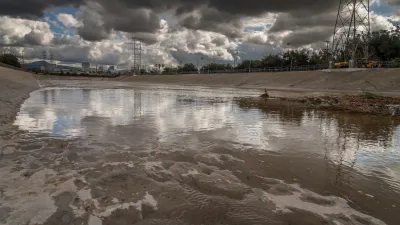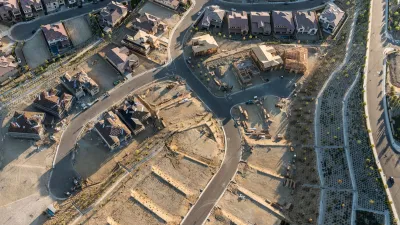While the east coast suffers through a brutal early summer heat wave, researchers in Los Angeles have announced the findings of the most advanced regional climate modeling ever conducted, which shows that So Cal will feel the heat soon enough.
Released this week, "Mid-Century Warming in the Los Angeles Region", which researchers at UCLA are calling "the most sophisticated regional climate study ever developed," shows that "climate change will cause temperatures in the Los Angeles region to rise
by an average of 4 to 5 degrees Fahrenheit by the middle of this
century, tripling the number of extremely hot days in the downtown area
and quadrupling the number in the valleys and at high elevations."
"That's the bad news," writes Damien Newton. "The good news, even by acting locally there is
something that L.A. can do....Today, the City released Adapt LA [PDF],
a fact sheet outlining what principles the city must embrace to both
prepare for higher temperatures and work to keep them as low as
possible, and C-Change LA , its new
climate change website. AdaptLA has four major components: 1)
science-based evaluation of the impacts of climate change; 2) assessment
of the vulnerability of and risks to City infrastructure and assets; 3)
regional collaboration; and 4) public engagement."
The C-Change website outlines the types of things homes and businesses can do to assist in minimizing and responding to climate change. Speaking this week, Mayor Antonio Villaraigosa
outlined some of the ways to keep the city cool: "That could mean replacing
incentives with building codes requiring 'green' and 'cool' roofs, cool
pavements, tree canopies and parks."
"'Mid-Century Warming in the Los Angeles Region' is the first of five
planned studies [UCLA climate expert Alex] Hall will conduct for the city and the LARC about how
climate change will affect the Southland. Hall's team plans to develop
similarly comprehensive models for local rainfall, Santa Ana wind
patterns, coastal fog (including June gloom), and soil moisture, run-off
and evaporation."
FULL STORY: The Keys to Beating, or at Least Fighting, Climate Change: Bikes, Transit, Parks, Trees

Maui's Vacation Rental Debate Turns Ugly
Verbal attacks, misinformation campaigns and fistfights plague a high-stakes debate to convert thousands of vacation rentals into long-term housing.

Planetizen Federal Action Tracker
A weekly monitor of how Trump’s orders and actions are impacting planners and planning in America.

San Francisco Suspends Traffic Calming Amidst Record Deaths
Citing “a challenging fiscal landscape,” the city will cease the program on the heels of 42 traffic deaths, including 24 pedestrians.

Defunct Pittsburgh Power Plant to Become Residential Tower
A decommissioned steam heat plant will be redeveloped into almost 100 affordable housing units.

Trump Prompts Restructuring of Transportation Research Board in “Unprecedented Overreach”
The TRB has eliminated more than half of its committees including those focused on climate, equity, and cities.

Amtrak Rolls Out New Orleans to Alabama “Mardi Gras” Train
The new service will operate morning and evening departures between Mobile and New Orleans.
Urban Design for Planners 1: Software Tools
This six-course series explores essential urban design concepts using open source software and equips planners with the tools they need to participate fully in the urban design process.
Planning for Universal Design
Learn the tools for implementing Universal Design in planning regulations.
Heyer Gruel & Associates PA
JM Goldson LLC
Custer County Colorado
City of Camden Redevelopment Agency
City of Astoria
Transportation Research & Education Center (TREC) at Portland State University
Jefferson Parish Government
Camden Redevelopment Agency
City of Claremont





























